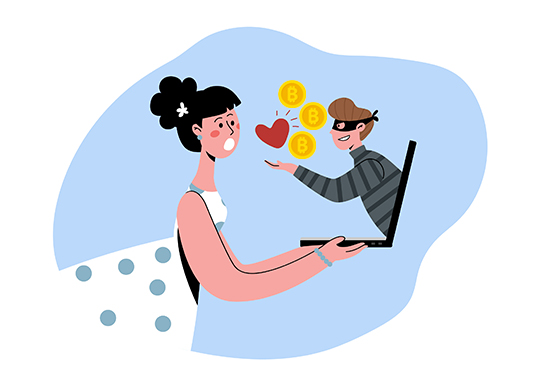Romance Scams: The Cryptocurrency Investor

(3 Minute Read) – There’s a new twist on an old romance scam that’s ripping off thousands of people to the tune of $133 million dollars this year alone. We’ve previously warned you about Romance Scams, but now the FBI has a new warning about a variation of these scams.
The latest version of the Romance Scam involves cryptocurrency. It typically starts the same way as the traditional scam: the victim is approached by the fraudster through a dating app or social media site. The scammer gains the victim’s confidence and trust, convincing them that their virtual love connection is real—and to hand over money.
In this new scam, the fraudster claims to be an expert cryptocurrency investor. Of course, they want their new true love to make money through this platform as well. They convince the victim to invest in the crypto, they allow them to withdraw a little bit of the profit from the so-called “account.” This is another tactic to gain the victim’s trust and convince them the investment is real.
This is where the scam evolves, according to the FBI. After that successful withdrawal, the scammer tells the victim to invest larger amounts of money. When the victim is ready to withdraw more “profits,” the scammer makes up reasons why the withdrawal can’t happen: there are additional taxes or fees that have to be paid first, or the minimum account balance hasn’t been met yet. Often, victims put in additional funds so they can access their “profits.” The scammers are so convincing, they sometimes send the victim to a “customer service group” which is also part of the scam.
As you can imagine, the scammer is just keeping all of the money. Once the victim catches on and stops sending money, the “relationship” usually ends. The scammer just ghosts the victim. All that money the victim handed over is long gone and cannot be recovered.
The FBI offers these tips to protect yourself:
- Never send money, trade, or invest based on the advice of someone you have only met online.
- Don’t talk about your current financial status to unknown and untrusted people.
- Don’t provide your banking information, Social Security Number, copies of your identification or passport, or any other sensitive information to anyone online or to a site you do not know is legitimate.
- If an online investment or trading site is promoting unbelievable profits, it is most likely that—unbelievable.
- Be cautious of individuals who claim to have exclusive investment opportunities and urge you to act fast.
What if I’m the victim of a romance scam?
If you’ve fallen victim to a romance scam, here are some steps you need to take immediately:
If you paid the scammer with a money order or wire, contact the financial service or institution you used to send the money and ask to cancel the transaction if possible. Be sure to report the fraud to them.
- If you paid the scammer using a gift card, contact the company that issued the card and inform them you just paid a scammer with a gift card and ask if they can refund your money. Be sure to report the fraud to them as well.
- Call the police and give them as much information as you can.
- The FTC recommends that you file a complaint online at ftc.gov. You can also report your experience to the FBI’s Internet Crime Complaint Center at ic3.gov.
- If you prefer, you can also call you state’s Attorney General’s Consumer Protection Hotline and ask that a complaint form be mailed to you:
- Oregon residents: 1-877-877-9392
- Washington residents: 1-800-551-4636
We’re here for you
If you think you’re a fraud victim, contact us right away. The sooner we learn about potential fraud, the more we can do to help. You can learn more about common online holiday scams and how to avoid them on our Security page.